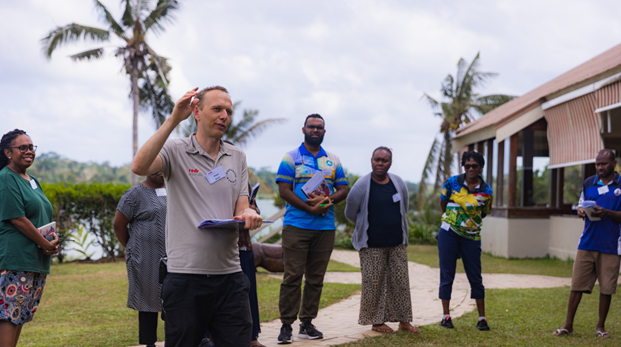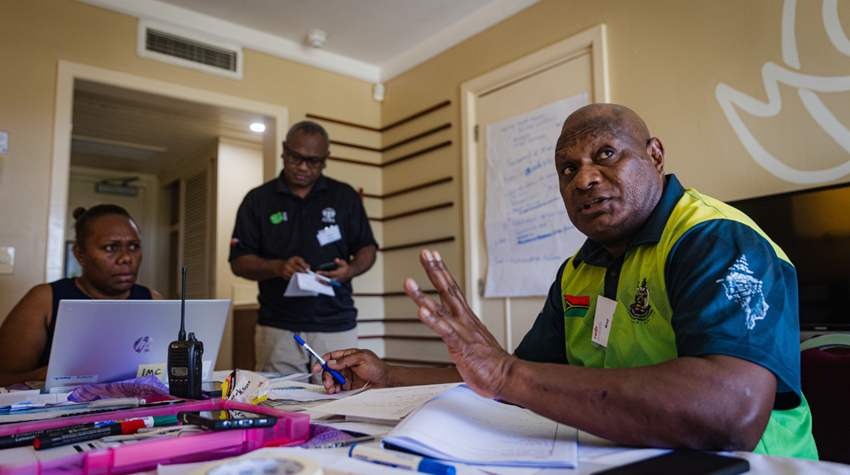Building on ground-breaking approaches from Fiji and Tonga, disaster management experts came together to take on the Essentials of Humanitarian Practice (EHP), a six-day course supported by the Australian High Commission in Vanuatu and Australia Assists, the Australian Government’s humanitarian civilian deployment program delivered by RedR Australia.
After the success of the highly regarded humanitarian course in Fiji and Tonga, the Vanuatu EHP course brought together experts from government ministries, civil-society organisations and NGOs to increase their understanding of international humanitarian principles, share knowledge and create deeper connections with others working in the sector.
Vanuatu, like many other Pacific nations, is highly experienced with disaster response. Over the past few years, the nation has faced tropical cyclones and volcanic eruptions along with the COVID-19 pandemic. In March 2023, back-to-back tropical cyclones Judy and Kevin made landfall causing widespread damage, affecting 80 per cent of the population. Demand for humanitarian training was driven by government ministries and civil society organisations who are increasingly called upon to respond to natural hazards.
Thirty participants joined the training, and Course Coordinator Grzic was astounded by the amount of experience that filled the room. It was clearly a knowledge-rich environment presenting a valuable opportunity to learn from each other and share new approaches to disaster response.
“What's really interesting is taking such an experienced group of participants who've worked in so many disasters and indeed have been affected by disasters themselves and bringing them along the journey that the Essentials of Humanitarian Practice offers,” Grzic said.
“We've seen them take their existing knowledge and skills and experience and try new things with it and incorporate global best practice and standards and ideas from around the world and put that into practice in a realistic context.”
 Course Coordinator Peter Grzic sharing his extensive international humanitarian expertise.
Course Coordinator Peter Grzic sharing his extensive international humanitarian expertise.
“Think, assess, react”
Over the six days of the EHP course, highly experienced humanitarian trainers from Australia, Zimbabwe, and Fiji, delivered a wide array of topics ranging from international humanitarian law to logistics. The training left a lasting impression on many participants, who collectively described the experience as ‘intense’, particularly in relation to the simulation learning.
“I enjoyed the simulations because they were so real-life, and taken so seriously, it pushed us to actually embrace the scenarios and think, assess, react as we would in a real crisis,” said one attendee.
Participant Alice Kalontano from the Australian High Commission Vanuatu, believes the training is essential for all disaster response professionals working in the Pacific.
“I highly recommend it for all who are directly involved in recovery and response - government, NGOs, donors, private sector organisations and medical personnel. The more the better for the Pacific due to our vulnerability to natural disasters.”
Providing support to responders
What makes this course truly impactful goes beyond the practical lessons learned. The chance for participants to dismantle barriers and share their lived experiences of disaster is what sets the training apart.
Troy Spann, leader of ProRescue in Vanuatu joined the course to see how the organisation could provide longer term support after disasters. The experience was enlightening as he learned from fellow participants and local responders the sacrifices they make to serve their communities in times of crisis.
“Immediately after disaster, we do chainsaw work, and we open up roads so that people can get to hospital, town and essential services but ProRescue’s work ends very quickly after a disaster. I wanted to know how we could do more.”
“Throughout the last few days, I found out that after a disaster, the staff of the NGOs, and especially in the National Disaster Management Office (NDMO), they work for a month, seven days a week, and they don't have a chance to go take care of their family and their homes. So, what I've learned is that ProRescue has got another job to do which is to find out whose homes have been damaged so that we can go fix them up. They're looking after the community so we can go and look after them.”
Utilising local capacity
Ni-Vanuatu disaster responders have extensive lived experience to share in the region and beyond. While a significant number of participants enrol in the course to enhance their contributions to national response efforts, EHP also serves as the first step to joining RedR Australia's humanitarian roster and deploying through Australia Assists. Enabling a greater number of Pacific Islanders to share their knowledge and skills with partners across the region and globally is a value add for localisation and improved practice in the disaster cycle.
Mark Gossage is a RedR Australia Associate Trainer and Australia Assists deployee to Vanuatu National Disaster Management Office. Many of his colleagues and counterparts participated in the training.
“I've seen very experienced humanitarian responders, their eyes light up when they see the range of tools and structures that are available to support them in their work,” said Mark.
“I think that after this course they'll be able to go back to their workplaces, to their organisations, and draw on this range of international tools and best practice to improve their work in response here in Vanuatu.”
By providing professional humanitarian training, such as the Essentials of Humanitarian Practice, Australia upholds its commitment to support our Pacific neighbours before, during and after disasters.
The delivery of the Essentials of Humanitarian Practice was supported by Australia Assists, Australian High Commission Vanuatu, The Pacific Community (SPC), NDMO Vanuatu and the Vanuatu Association of NGOs (VANGO).


